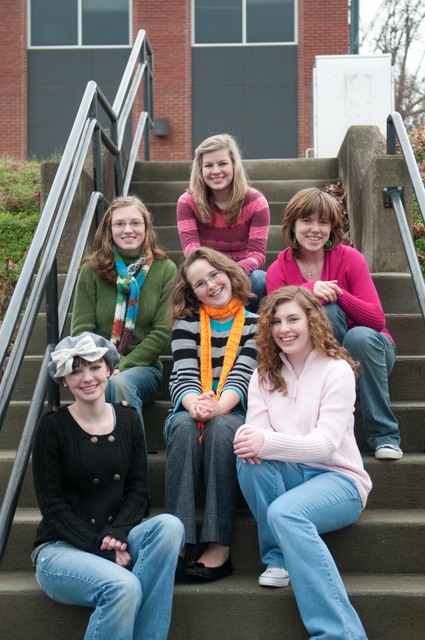A Passion for Authenticity
 When my sisters and I were in our mid to late teens, we suddenly and surprisingly found ourselves in prime role model territory. On paper, it probably looked beautifully ideal: we followed God, we had graduated or almost-graduated from highschool at home, we liked each other and our family, we published a magazine for Christian young women, and we helped our parents run a café and quilt store in a hundred-year-old schoolhouse right next door to our home. If it sounds fun and happy and kind of idyllic, that’s because it was. We loved it.
When my sisters and I were in our mid to late teens, we suddenly and surprisingly found ourselves in prime role model territory. On paper, it probably looked beautifully ideal: we followed God, we had graduated or almost-graduated from highschool at home, we liked each other and our family, we published a magazine for Christian young women, and we helped our parents run a café and quilt store in a hundred-year-old schoolhouse right next door to our home. If it sounds fun and happy and kind of idyllic, that’s because it was. We loved it.
But we were also just three very ordinary girls following God and doing life, and that’s how our closest friends (and the girls we actually were mentors to) saw us. But from the flattering blur of distance, maybe we looked like a trio of Rebecca St. Jameses (with less fashion chops and worse voices) or something, because we soon found ourselves with a social calendar quickly filling up with people who had ‘heard about the Careys’ and wanted to come meet our family. Having a café next door gave our home a kind of open-all-hours feel, and friends of friends of friends would pop in to meet us in the hopes of like-minded companionship.
We made some incredible enduring friendships that way, but we also got severely burnt out. In amongst the genuine requests for fellowship, there were a lot of people who really just wanted to see what the perfect homeschool family looked like in the flesh – and of course they were disappointed. Perfection is one thing we’d never really mastered. You can bet I tried, though. When I realised people were visiting once, discovering we were normal (boring, even) and never contacting us again, I began to examine all the reasons why my family and I had failed to meet the standards of Christian perfection, and then I started striving to achieve that.
I wasted a lot of time chasing my tail and inwardly critiquing aspects of our lives that I thought failed to come up to scratch. But while striving to realise perfection, God helped me realise something else altogether: that the Christian walk has never been about perfection, particularly a perfection that strives to meet others’ approval. The desire to please people continues to haunt me, but growing up alongside it is a passion for authenticity, one which influences how I relate to others, how I share, how I think about community, and how I write.

‘We are afraid of what will happen if we reveal ourselves, even to (perhaps most especially to) other believers. If others see our sin, if they see us for who we really are, they won’t want us. They won’t include us. They won’t respect us. We all crave love and respect, but living to get them always leads us away from them.’
(Joy: a Godly Woman’s Adornment, Lydia Brownback, p. 63)
Perfection has never characterised the Christian church. Perfection characterises Christ, and that’s why we need Him: because we possess none of it ourselves.
During the time of Jesus’ ministry, inauthenticity was evident in the attitude of the Pharisees, who were incredibly concerned with how they represented their religion (ouch — that hits close to home). The problem is that they focused on an outward representation while neglecting the God-centred relationship that was supposed to be undergirding it all. The Pharisees wanted to perfectly represent God without actually seeming to need Him. In response, Jesus called them whitewashed tombs which ‘outwardly appear beautiful’ but which inwardly are full of filth (Matt. 23:27, ESV). ‘It’s not the healthy people I’m here for,’ Jesus told his disciples, ‘but the sick’ (Luke 5:31, paraphrase).
Next to Jesus’ perfect healthiness, we are all sick.
‘All of you labour and are heavy laden, [Jesus] says. It is an appalling thing to tell us when we are trying so hard to pretend that it is not so, just as it is appalling to tell even the young and beautiful and full of hope that the poor naked wretches of the world are themselves.’
(Telling the Truth: the Gospel as Tragedy, Comedy, and Fairy Tale, Frederick Buechner, p. 42.)
Churches, then, are meant to be hospitals – filled with the broken, the wounded, and the ill, all of us in need of a physician. If in any way we are whole, it is a borrowed wholeness, a gifted wholeness that comes through the sacrifice of the cross. It’s not something we earned or worked towards. It’s grace.

‘True integrity goes deeper. It has to do with authenticity. Persons of integrity are free from duplicity. With them, you don’t go away wondering whether they are motivated by hidden agendas. Authenticity points us toward an even more important dimension. Integrity means “acting in accordance with one’s stated beliefs”. Persons of integrity stand for their convictions, even at great personal cost’.
(Who Needs Theology? Stanley J. Grenz & Roger E. Olson, p. 132)
The men and women God chose for communicating His message throughout the ages were invariably broken people, and the ones whose words continue to bolster us on the journey are the ones who were deeply genuine about their faith. The apostle Paul was open about his own struggles and imperfections and the God who redeemed him in spite of them, while the Psalms overflow with authentic confession, lamentation, questions, and praise.
Authenticity does not mean wallowing in our filth or reveling in our humanity for its own sake. Since it naturally occurs in every one of us, there is no great virtue in being flawed. But neither is authenticity about telling deep details of the truth when they’re not asked for, or continually calling other people out on their junk. There will probably be times in all of our lives when we need to say a hard thing to someone we care about. But Jesus warned against focusing on specks while ignoring logs (Matthew 7:3). Authenticity is less about calling other people out on their issues and more about not sweeping our own under the carpet. It’s calling ourselves out on our dishonesty, our preaching of a Saviour that we pretend we don’t need.

God’s people are called to be honest. They are called to share. And they’re called to carry each other’s burdens.
‘If we open up and be real, others will feel free to do so. There is nothing more hollow and Spirit-quenching than a roomful of believers who whitewash their conversation with superficial piety. Real love opens up, and it always leads to joy.’
(Joy: a Godly Woman’s Adornment, p. 63)
We cannot achieve this by wearing masks. Instead, we must practice authenticity, praying that we may be broken, marred vessels pointing to a whole and perfect God.

So glad I read this. Excellently written – a true expose on authenticity. My favorite line (painful as this truth may be!): “preaching of a Saviour that we pretend we don’t need.” How true that is! Thank you, Danielle.
Absolutely phenomenal truths. I’m so thankful that you shared this. Beautiful writing and even more beautiful…authenticity. This hit home tonight. Thank you. 🙂
So beautifully honest and true…thank you.
This is such a great post! I can definitely relate.
I’ve reached one of those seasons in life that I used to dream about: I’m married to a pastor, have 4 beautiful children, have my own little house to take care of, am homeschooling, etc, etc. Obviously, I plainly see the reality of my life- it is no more perfect now than it has ever been!
Being transparent with others, particularly those whom I know may look up to me, hasn’t always come easy for me. The Lord had some rooting out and pruning to do in my life before I could honestly say I was comfortable being imperfect (and not ashamed for others to know about it!).
Ironically, is so freeing to let go of perfection and embrace true humility and service to others. It’s difficult- no, impossible- to truly serve people when you’re holding them at arm’s distance so they won’t discover your imperfections!
God is so patient with us. 🙂
Oh, wow… this really hit home for me – it reflects exactly what’s been on my heart lately! Thank you for being so honest and truthful and encouraging us all to let go of what does not satisfy and taking hold of the truth that sets us free! Freedom in Christ is the best feeling in the world, far surpassing any lesser comforts and securities that we seek.
I grew up in a very performance-based environment and appearance was very much emphasized, so I am still struggling with this as an area of weakness, but it’s amazing to hear of others who share the struggle and show God’s faithfulness.
Thank you for being real and saying it so beautifully!
Wait, are you ladies (in above pictures) all sisters? I love love love big families, so just curious! 😀
These pictures are all from the YLCF logo photoshoot by Jennifer Pinkerton. I believe there is a pair of sisters in there, but they aren’t all sisters. 🙂
Wonderful! How come we are all so scared of this?! Thanks for the reminder that we don’t have to be afraid of what people think of us, we just have to walk like only the Lord is watching! 🙂
Much Love!
One of my favorites yet…very good post! Something I really need to take to heart…
Everly
Thank you for sharing with us, Danielle.
I can certainly relate to striving for perfection and the drive to please man…. and falling short, continually.
I think you defined authenticity very well! It’s being honest, open, genuine and yes, even vulnerable.
LOVE!! Thank you! I feel that this is so crucial for Christians– to seek and practice authenticity! Not watering down what Jesus asks of us, yet not acting like we have it all together to others. 🙂
Grace and peace,
Laura
Thank you for this article 🙂 It was something I needed to read today – I’ve struggling through this at the moment….
I really appreciate your comment, Laura @ Life is Beautiful…. Your definition is great! Not watering down Christ and His call, but also not acting ‘like we have it all together’… because I sure don’t! 🙂 ah, I am thankful for grace…
Blessings!
Love,
Rachael
heldbyhishand.blogspot.com
thank you! oh so true!